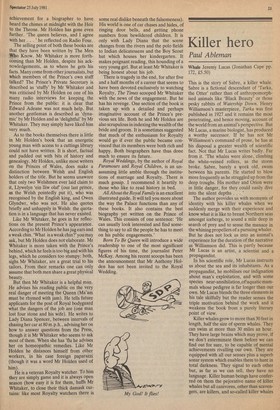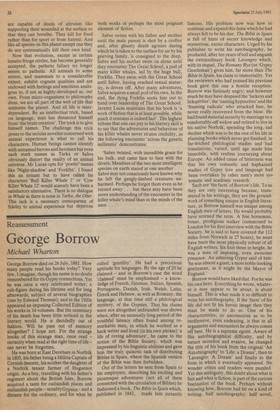Killer hero
Paul Ableman
Whale Jeremy Lucas (Jonathan Cape pp. 172, £5.50) This is the story of Sabre, a killer whale. Sabre is a fictional descendant of `Tarka, the Otter' rather than of anthropomorphised animals like 'Black Beauty' or those pesky rabbits of Watership Down. Henry Williamson's masterpiece, Tarka was first published in 1927 and it remains the most penetrating, and hence moving, account of the world from an animal's perspective. But Mr Lucas, a marine biologist, has produced a worthy successor. If he has not Mr Williamson's command of prose, he has at his disposal a greater wealth of scientific fact. Not that Mr Lucas writes badly. Far from it. 'The whales were alone, climbing the white-veined rollers, as the storm broke. Sabre, barely a week old, swam between his parents. He started to blow more frequently as he struggled up from the deep troughs. His mother and Orion were in little danger, for they could easily dive into the silent depths .
The author provides us with moments of identity with his killer whales when we suddenly merge with their experience and know what it is like to breast Northern seas amongst icebergs, to sound a mile deep in search of prey and to sense the menace in the whining propellers of a pursuing whaler. But he does not lock us into an animal's experience for the duration of the narrative as Williamson did. This is partly because Mr Lucas is an artist, a scientist and a propagandist.
In his scientific role, Mr Lucas instructs us about the sea and its inhabitants. As a propagandist, he mobilises our indignation about man's exploitation, and with some species near-annihilation , ofiaquatici mammals whose pedigree is far longer than our own. Mr Lucas blends the three elements in his tale skilfully but the reader senses the triple motivation behind the work and it weakens the book from a purely literary point of view.
Killer whales grow to more than 30 feet in length, half the size of sperm whales. They can swim at more than 30 miles an hour. They have large brains which may prove, if we don't exterminate them before we can find out for sure, to be capable of mental achievements rivalling our own. They are equipped with all our senses plus a superb sonar system which enables them to hunt in total darkness. They signal to each other but, as far as we can tell, they have no language. Killer human beings have conferred on them the pejorative name of killer whales but all canivores, other than scavengers, are killers, and so-called killer whales
are capable of deeds of altruism like supporting their wounded at the surface so that they can breathe. They kill for food rather than for sport or from hatred. And like all species on this planet except one they do not systematically kill their own kind.
Now that evolution, except in certain lunatic-fringe circles, has become generally accepted, the pathetic fallacy no longer seems so pathetic. All animals to some extent, and mammals to a considerable extent, exhibit cognate qualities and are endowed with feelings and emotions analogous to, if not as highly-developed as, our own. From micro-organisms to philosophy dons. we are all part of the web of life that animates the planet. And all life is interdependent. By an intellectual trick, based on language, man has distanced himself from 'the brute creation'. The trick is to give himself names. The challenge this trick poses to the serious novelist concerned with animal experience is what to call his characters. Human beings cannot identify with unnamed heroes and heroines but even such stark names as Tarka or Sabre obviously distort the reality of an animal universe. Mr Lucas opts for 'poetic' names like 'Night-shadow' and 'Forkfin'. I found this an irritant but to have called his characters 'Bull Killer Whale 1' or 'Cow Killer Whale 12' would scarcely have been a satisfactory alternative. There is no dialogue in Whale as there is none in Tarka, the Otter. This lack is a necessary consequence of fidelity to animal experience but °deprives both works of perhaps the most poignant element of fiction.
Sabre swims with his father and mother until the male parent is shot by a crofter and, after ghastly death agonies during which he is taken to the surface for air by his grieving family, is consigned to the deep. Sabre and his mother swim on alone until they encounter The Great School, a pod of many killer whales, led by the huge bull, Forkfin. They swim with the Great School until Sabre, having reached sexual maturity, is driven off. After many adventures, Sabre acquires a small pod of his own. In the end, the dying Forkfin seeks him out to hand over leadership of The Great School. Jeremy Lucas maintains that his book is 'a work of fiction that is at least possible, while much it contains is indeed fact'. The highest tribute that one can pay to his literary skill is to say that the adventures and behaviour of his killer whales never strains credulity, as the following encounter 'across the genetic millennia' demonstrates: 'Sabre twisted, with incredible grace for his bulk, and came face to face with the divers. Members of the two most intelligent species on earth stared at one another . . . Sabre may not consciously have known why he left the gangly-limbed creatures unharmed. Perhaps he forgot them even as he turned away . . . but there may have been more understanding of the encounter in the killer whale's mind than in the minds of the men . .



































 Previous page
Previous page